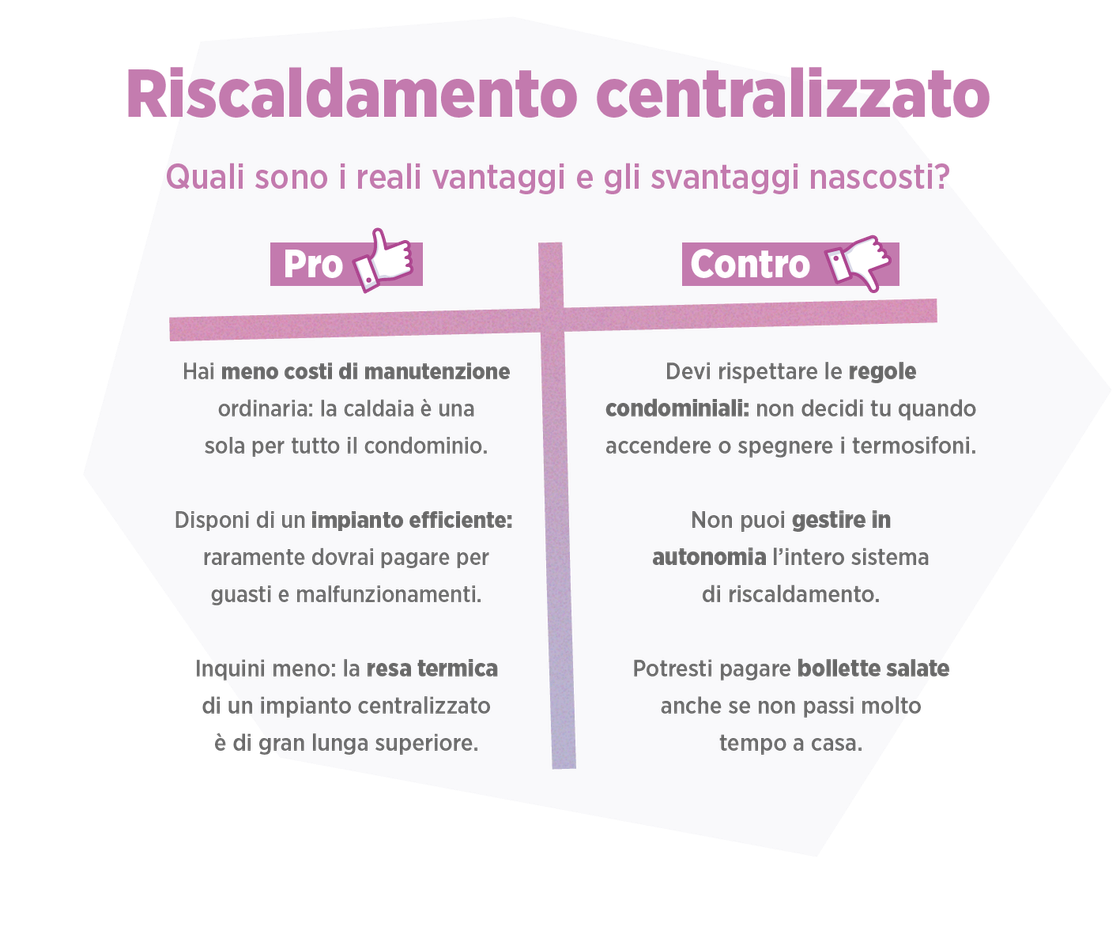Index
Are you moving into an apartment building and dreading the winter bills? Then it's essential to understand how a central heating system works. It's a very popular system that offers some advantages over an independent system, but you need to understand whether it's really the best solution for you.
Before you decide whether to turn up your nose or not, we at Casavo will help you clarify your ideas on advantages and disadvantages - and explain to you how, if necessary, to detach yourself from it.
What we talk about in this article
- Watch your accounts: advantages and disadvantages
- How to detach yourself from the central heating system centralized
- Some tips for saving on costs
- To sum up | Advantages and disadvantages
Watch the numbers: advantages and disadvantages of central heating
No system is 100% perfect, but knowing the characteristics of central heating will allow you to use it better and even save money.
Pros: a single system
When central heating is provided, condominium members share a single boiler that serves all the apartments. Therefore, you don't have to buy your own, nor worry about its annual maintenance.
Pro: greater efficiency
The boilers in central heating systems are more efficient and less polluting because, for the same power, they consume less energy. They also last longer and require fewer repairs.
Pro: shared costs
All expenses, including boiler cleaning, are shared among the residents of the condominium.
Cons: time slots set a priori
The unpleasant aspect of operating a central heating system is that you can't decide when to turn on the radiators and how to use them.
The optimal temperature for private buildings is set by law at 20°B, and should never exceed 22°B. Law number 10 of 01/09/1991 then divided Italy into zones based on their geographical characteristics, establishing some rules for the use of heaters.
Zone On hours On period A 6 1 December – March 15 B 8 December 1 – March 31 C 10 November 15 – March 31 D 12 November 1 – April 15 E 14 October 15 – April 15 F No limits No limits
Even the time slots for switching on a central heating system are decided a priori by the individual condominium.
Cons: choosing the system
You cannot independently choose the type of fuel to use or the model of radiators that best matches your decor.
Cons: Higher bills
You'll enjoy a generally warm home, but the cost of heating will be higher.
When talking about energy efficiency, all of these aspects must be considered, but not only. Just think about the thermal insulation of a home and the advantages that a thermal insulation would bring, or the convenience of investing in better windows thanks to the Superbonus 110. Unfortunately, however, sharing the system with the rest of the condominium means it is not always possible to carry out the desired renovations. So if you want total control over your utilities, an independent network is the only option.
How to disconnect from the central heating system
Is it possible to have an independent heating system in a condominium with central heating? Certainly, and it requires a simple procedure.
If you intend to take advantage of the benefits of a private boiler, perhaps an ecological biomass model is You need to know how to disconnect from the central heating system. The important thing is not to damage the building's heating system, not to alter its thermal balance, and not to cause harm to other condominium residents. An expert will assess the sustainability of the work, so not even the condominium assembly will be able to challenge your decision.
There's just one small drawback, though: not to dampen your enthusiasm, but you should know that it can be quite expensive. In fact, you will have to purchase a new boiler and a chimney, adapt the previous system and pay for the technical assessment.
The good news is that there are several ways to reduce costs without giving up central heating.
Some tips for saving on central heating costs
If you are wondering how to save on central heating, the first step is to purchase thermostatic valves. With these tools, it becomes very simple to regulate the temperature of the radiators, and you can finally avoid heating at maximum power when you are not at home.
Combining them with devices that measure consumption, now mandatory since 2016, each apartment only pays for what it actually uses. It may seem like a compromise, but it's a bit like having central heating with an independent meter.
It doesn't end there: you have many other solutions available to reduce the costs of central heating. Making the most of natural light, installing an underfloor heating, and not covering the radiators when they are on are certainly useful tips, but they won't optimize consumption as much as regular monitoring. There are now technological accessories on the market that allow you to improve the way you heat your home, and therefore save significantly on your bills. If the home of the future is becoming smart, home automation devices are already the present - and a smart solution for those like you who want to optimize costs.

